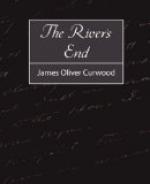Even when he had done, she did not move or speak. He went into his room, closed the door, and turned on the lights. Quickly he put into his pack what he needed. And when he was ready, he wrote on a piece of paper:
“A thousand times I repeat, ‘I love you.’
Forgive me if you can. If you cannot forgive,
you may tell McDowell, and the Law will find me up
at the place of our dreams—the river’s
end.
—John Keith.”
This last message he left on the table for Mary Josephine.
For a moment he listened at the door. Outside there was no movement, no sound. Quietly, then, he raised the window through which Kao had come into his room.
A moment later he stood under the light of the brilliant stars. Faintly there came to him the sounds of the city, the sound of life, of gayety, of laughter and of happiness, rising to him now from out of the valley.
He faced the north. Down the side of the hill and over the valley lay the forests. And through the starlight he strode back to them once more, back to their cloisters and their heritage, the heritage of the hunted and the outcast.
XXIII
All through the starlit hours of that night John Keith trudged steadily into the Northwest. For a long time his direction took him through slashings, second-growth timber, and cleared lands; he followed rough roads and worn trails and passed cabins that were dark and without life in the silence of midnight. Twice a dog caught the stranger scent in the air and howled; once he heard a man’s voice, far away, raised in a shout. Then the trails grew rougher. He came to a deep wide swamp. He remembered that swamp, and before he plunged into it, he struck a match to look at his compass and his watch. It took him two hours to make the other side. He was in the deep and uncut timber then, and a sense of relief swept over him.
The forest was again his only friend. He did not rest. His brain and his body demanded the action of steady progress, though it was not through fear of what lay behind him. Fear had ceased to be a stimulating part of him; it was even dead within him. It was as if his energy was engaged in fighting for a principle, and the principle was his life; he was following a duty, and this duty impelled him to make his greatest effort. He saw clearly what he had done and what was ahead of him. He was twice a killer of men now, and each time the killing had rid the earth of a snake. This last time it had been an exceedingly good job. Even McDowell would concede that, and Miriam Kirkstone, on her knees, would thank God for what he had done. But Canadian law did not split hairs like its big neighbor on the south. It wanted him at least for Kirkstone’s killing if not for that of Kao, the Chinaman. No one, not even Mary Josephine, would ever fully realize what he had sacrificed for the daughter of the man who had ruined his father. For Mary Josephine would never understand how deeply he had loved her.




